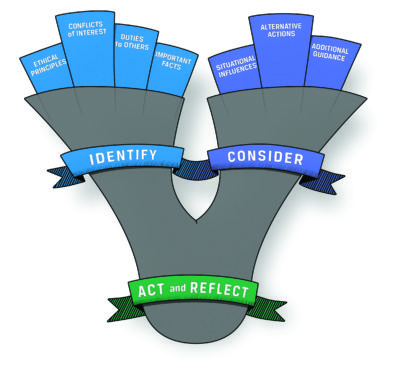Ethics in Practice: Counterparty Risk. Case and Analysis–Week of 7 January
How does your answer choice for this week’s case (7 January) compare with the analysis? Check it out below.
Case
Gostkowski is an analyst for Banner Investment Management (Banner). Banner’s most significant line of business is its repurchase agreements (repo) program, which offers investment advisory clients the opportunity to invest in loan portfolios with portions of loans guaranteed by various government entities, including the US Department of Agriculture (USDA). Banner markets the program as a higher-yield alternative to money market accounts. Banner discloses to clients and regulators that it conducts initial and ongoing due diligence and monitoring of repo counterparties, including the counterparties’ financial condition.
As part of these reviews, Gostkowski uses a checklist of the documents he needs to obtain from repo counterparties. The checklist includes certain financial information, including annual audited financial statements. But Banner does not provide any written guidance for Gostkowski regarding its practices for addressing material or problematic information.
During the course of the repo program, Banner begins using Farmers First Financial (Farmers First) as a repo counterparty. Initially, Farmers First provides Gostkowski only unaudited financial statements. Farmers First tells Gostkowski that it is in the process of hiring a new auditor to audit its financial statements and says it will be filing for an extension on submitting the required filings. During his initial due diligence, Gostkowski conducts a background check on Farmers First and its principals. Gostkowski discovers that the Farmers First CEO has not graduated from college, has a poor credit history, has pleaded no contest to assaulting a police officer, has been convicted of two charges of driving under the influence, and has been sued multiple times for breach of contract. Gostkowski does confirm Farmers First’s status as an approved USDA lender, but he does not attempt to verify other representations made by Farmers First or contact its references. Gostkowski is informed by Banner’s legal counsel that the USDA should honor its guarantee unless Banner had actual knowledge that Farmers First had participated in fraud or misrepresentation.
When Gostkowski eventually receives the audited financial statements from Farmers First, they contain discrepancies with the unaudited financial information provided during the initial due diligence. Gostkowski also cannot find evidence that the auditor listed on the Farmers First financial statements exists. Gostkowski conducts an on-site visit at Farmers First’s offices and finds no evidence that the firm has five to seven employees, as claimed in its initial disclosures. Gostkowski also cannot locate the purported underlying borrowers for several of Farmers First’s loans. The USDA eventually confirms to Gostkowski that a representative sample of the loans purchased from Farmers First were fraudulent and subsequently informs Banner that it will not honor the guarantee. As a result, Banner’s investors in the repo programs associated with Farmers First lost millions of dollars. Gostkowski’s actions are
- inappropriate.
- appropriate because he collected the financial statements from Farmers First and did background checks on both the company and its principals before Banner engaged with the company.
- appropriate because he confirmed Farmers First was a USDA-approved lender and was told by legal counsel that the company’s loans were guaranteed by the government.
- appropriate because he conducted an on-site visit of Farmers First’s offices once he had concerns about the company.
- none of the above.
Analysis
This case relates to an investment professional’s responsibility to conduct due diligence on investments on behalf of clients and investors. CFA Institute Standard of Professional Conduct V(A): Diligence and Reasonable Basis requires CFA Institute members to exercise diligence, independence, and thoroughness in analyzing investments and to have a reasonable and adequate basis for investment recommendations and action. Banner and Gostkowski have a responsibility to thoroughly investigate Farmers First as a counterparty before allowing clients to invest in the associated repo program.
The facts indicate that Gostkowski took a number of steps to conduct due diligence, including collecting financial statements, conducting background checks, confirming that the firm was USDA approved, checking with counsel on potential liability issues, researching the Farmers First auditor, and trying to investigate the underlying assets (loans) at the heart of the repo investment. But many of these steps were inadequate, raised red flags that were ignored, or happened only after Banner had committed client assets to a fraudulent investment. As a result, the facts are sufficient to indicate that Gostkowski and Banner failed to exercise appropriate due diligence with respect to the Farmers First repo investments. Choice A is the best answer.
This case is based on a November 2018 Enforcement Action by the US SEC.
Let us know what you think of Ethics in Practice by taking this short survey.
Have an idea for a case for us to feature? Send it to us at [email protected].
More About the Ethics in Practice Series
Just as you need to practice to become proficient at playing a musical instrument, public speaking, or playing a sport, practicing assessing and analyzing situations and making ethical decisions develops your ethical decision-making skills. The Ethics in Practice series gives you an opportunity to “exercise” your ethical decision-making skills. Each week, we post a short vignette, drawn from real-world circumstances, regulatory cases, and CFA Institute Professional Conduct investigations, along with possible responses/actions. We then encourage you to assess the case using the CFA Institute Ethical Decision-Making Framework and through the lens of the CFA Institute Code of Ethics and Standards of Professional Conduct. Then join the conversation and let us know which of the choices you believe is the right one and explain why. Later in the week, we will post an analysis of the case and you can see how your response compares.
Image Credit: ©CFA Institute


D is the answer.
A
A is the right answer. Not enough due diligence and reasonable basis for investment.
A is the right answer. Not enough due diligence and reasonable basis for investment.